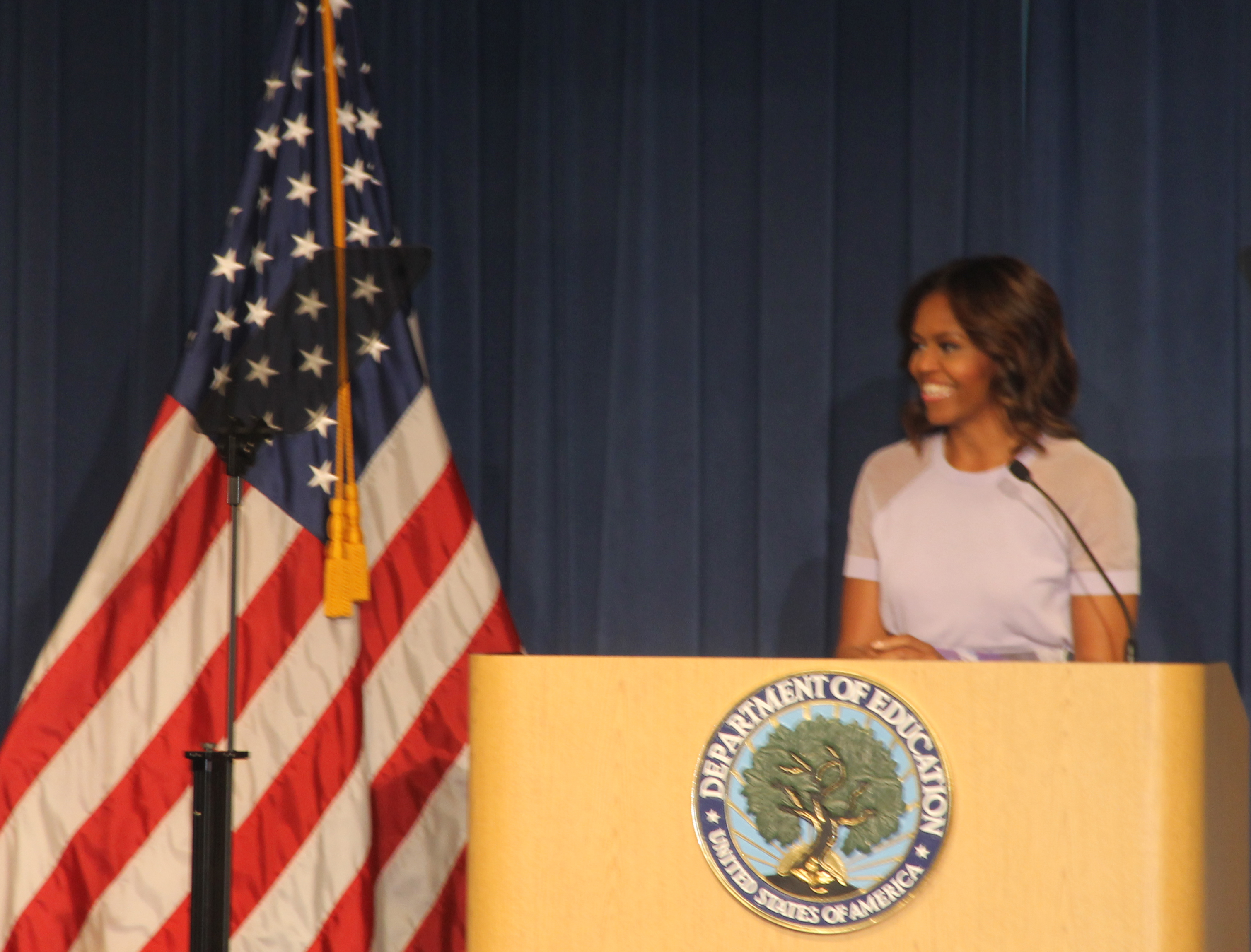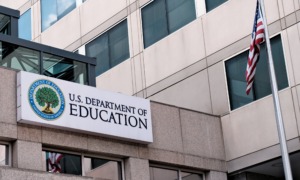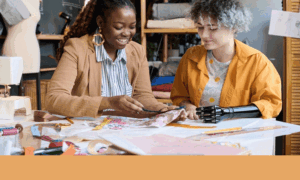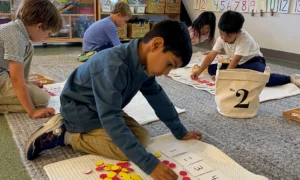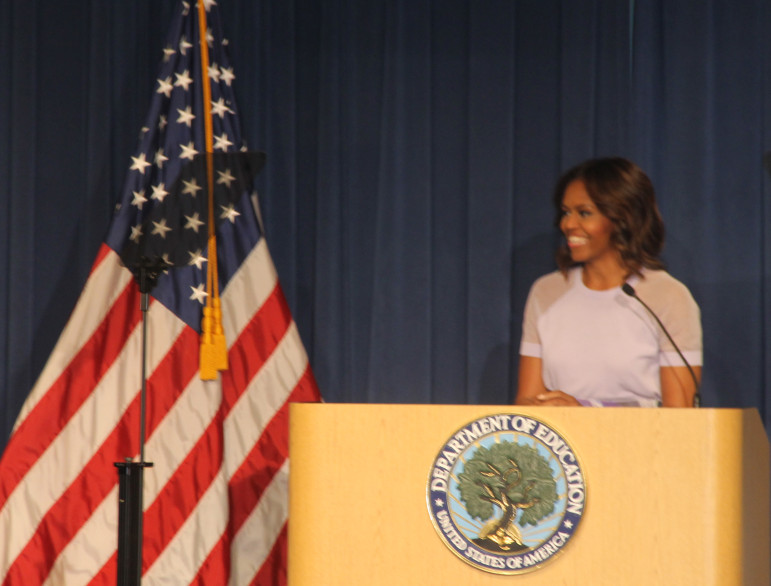
Gary Gately / Youth Today
First Lady Michelle Obama speaks to about 200 youths and educators Friday at the U.S. Education Department. “We’re going to work to make sure that every young person in America can have a great summer learning experience,\” she said.
WASHINGTON — Ah, summertime, and learning opportunities abound — but not for everyone.
The Baltimore-based National Summer Learning Association (NSLA) says only about one-third of low-income youths participate in a summer learning program, and those who do often lack access to high-quality programs.
First Lady Michelle Obama wants to change that.
“We’re going to work to make sure that every young person in America can have a great summer learning experience no matter where they come from or how much money their parents have,” the first lady told about 200 youths and educators here Friday.
Obama pledged to make expansion of the summer learning programs a priority as part of her Reach Higher initiative, which seeks to inspire all U.S. students to complete education beyond high school, whether in college or a professional training program.
Her remarks came during a 14-minute speech the U.S. Education Department, which she visited to kick off Summer Learning Day, a nationwide effort led by the NSLA.
Summer Learning Day features more than 600 events nationwide that call attention to the importance of summer learning opportunities and highlight programs that curb what’s known as summer learning loss, the summer slide or brain drain — the loss of reading and math skills during the summer months.
“As young people, your job is to make the most of your summer so that you can reach your potential and achieve every last one of your dreams,” Obama said.
For students who want to get into college and get good jobs, Obama said: “Summer can’t be just a vacation. It’s really a time to try to get ahead.
“It’s also about keeping your minds fresh because research shows that if you just sit around and you don’t work out your brain all summer, you not only miss out on new information, you actually lose … knowledge from the previous [school] year.”
Obama also emphasized the importance of reading voraciously to help counter the summer slide.
Sarah Pitcock, CEO of the National Summer Learning Association, who also spoke to the youths and educators Friday, stressed the importance of high-quality summer learning programs for all children, but noted many low-income children lack access to them.
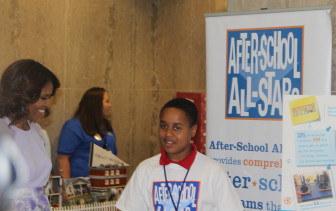
Gary Gately / Youth Today
Rhece Denmon-Nixon, a 12-year-old student at Stuart-Hobson Middle School in Washington, D.C., tells First Lady Michelle Obama about the After-School All Stars program.
“Momentum is clearly building across the country for a new vision for summer learning, but we have work to do,” Pitcock said. “We know more kids would participate if opportunities were available in their communities.”
The lack of programs for low-income youths is particularly troubling: Research reveals most youth lose two months in math skills over the summer, but low-income children also lose more than two months in reading achievement while their middle-income peers make slight gains in reading.
And summer learning losses are cumulative. That means a low-income student typically lags nearly three grades behind his middle-income peers in reading by the end of elementary school, mostly due to summer reading loss, Johns Hopkins University researcher Karl Alexander has found.
Obama, a graduate of Princeton University and Harvard Law School, called summer learning a key ingredient in preparing for college.
“You can do this. You can. If I can do it, you can do it,” Obama said. “But that starts right now, OK? So I want you to stay focused over these next few months and in the summers ahead.
“That doesn’t mean you can’t have any fun. You all should be getting outside, hanging out with your friends, getting some exercise. Don’t forget about that,” said Obama, plugging her Let’s Move initiative to promote regular exercise and healthy eating.
“But,” she added, “you also have to keep your eyes on the prize and you’ve got to keep that college degree as your North Star so you can’t let this summer go to waste.”
Before her speech, Obama briefly visited and chatted with kids from several of the eight summer learning programs on exhibit in the Education Department’s lobby.
Shavonne Campbell, a rising eighth-grader at the High School for Global Citizenship in Brooklyn, New York, showed Obama an interactive game he helped develop called “First on the Field,” which simulates situations Jackie Robinson encountered when he broke the color barrier in Major League baseball in 1947.
Shavonne told Youth Today he was nervous before Obama arrived at the exhibit for his program, Global Kids, which strives to develop youth leaders for the global arena.
“But when she came up to me, everything just flowed out,” Shavonne said. “I said everything I had to say, and she seemed very interested in our game, so I was very happy.
“I described the game to her. I told her how difficult it was for Jackie Robinson, why we actually care.”
Annie Willis, a 17-year-old rising senior at Long Island City High School in Queens, New York, and a member of the Global Kids board of directors, said she will heed Obama’s message to read a lot, prepare for college and take part in a quality summer experience: Annie’s taking SAT prep classes and through Global Kids, landed at internship this summer at the Council on Foreign Relations in New York.
NSLA’s Pitcock noted summer learning has come a long way in the more than 20 years that the association has worked to build awareness of the need for high-quality summer learning opportunities.
“When we started this work, the terms ‘summer learning loss’ and ‘summer slide’ didn’t exist, and we didn’t know much about the potential of summer learning to transform student success,” she said. “But we know now.”
Financial supporters of Youth Today may be quoted or mentioned in our stories. They may also be the subjects of our stories.


